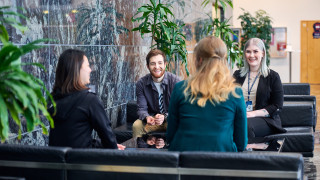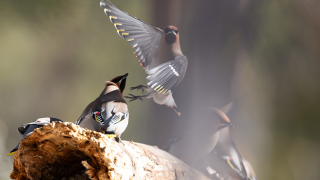Dissertation: Paradoxes between economic and environmental value creation are a frequent barrier in corporate circular economy transitions - but they could also become a driver

A growth-oriented economy built on linear production and consumption patterns contributes to global sustainability challenges, such as climate change, biodiversity loss and depletion of natural resources. Great hopes and expectations for the realisation of sustainable development are placed on the idea of circular economy: the closed circulation of resources enabling economic well-being without jeopardizing social and environmental well-being. Success in the circular economy transition requires the active participation of the corporate sector, but circular economy efforts in companies are often hindered by paradoxical tensions particularly between economic and environmental value creation.
In her dissertation, Noora Piila, M.Sc. (Econ.), examines the ways in which these tensions prevent corporate circular economy transitions – and, on the other hand, the untapped potential they hold for promoting said transitions.
"Companies experience different drivers, challenges, and paradoxical tensions in their circular economy efforts, depending on how far along they are on their circular economy journey," says Noora Piila. "Therefore, the so-called circular economy maturity is a key perspective in examining corporate circular economy transition."
Corporate circular economy transition can be promoted through stakeholder collaboration
The doctoral research finds that the intensity of the tensions experienced between economic and environmental value creation is linked to the circular economy maturity of companies, but that three specific paradoxes obstructing circular economy transitions are universal across companies. These are the contradiction between customers’ circular economy -related intentions and actions, the tension between company-level circular economy adoption and broader societal circular economy transition, and the negative effects of conflicting legislation. Based on these findings, the research presents recommendations for practical measures to promote corporate circular economy transition through stakeholder collaboration.
"Identifying, addressing and harnessing paradoxes to find creative circular economy solutions is important for enabling the circular economy transition in companies and in society more broadly. Other companies, legislation, customers, and especially political decision-makers and industry associations play an important role in turning tensions from a barrier into a driver," Piila describes.
The examination of Noora Piila's doctoral dissertation in Corporate Environmental Management "Acknowledging, addressing and harnessing paradoxes in the corporate circular economy transition - perspectives from frontrunners and laggards" will be held on Friday, November 14, 2025 at 12:00 in Hall C5 of the main building of the University of Jyväskylä. The opponent will be Professor Anne Toppinen (University of Helsinki, Faculty of Agriculture and Forestry) and the custos will be Professor Tiina Onkila (University of Jyväskylä). The language of the event is English.
Take a look at Noora Piila's dissertation.
More information:
Noora Piila
noora.piila@gmail.com




